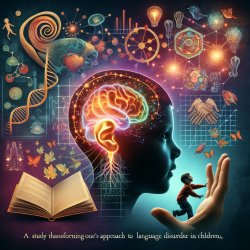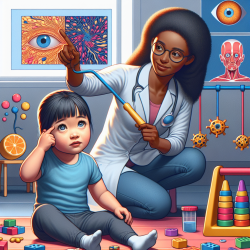The journey of understanding mental health is complex, and recent research has shed light on a crucial aspect: the intergenerational transmission of childhood adversity and its impact on adolescent psychotic experiences. As a practitioner in the field of mental health or education, understanding these dynamics can significantly enhance your approach to therapy and intervention strategies.
The Study: A Deep Dive into Intergenerational Trauma
The research titled A Prospective Cohort Study on the Intergenerational Transmission of Childhood Adversity and Subsequent Risk of Psychotic Experiences in Adolescence, conducted by Bolhuis et al., explores how maternal childhood adversity influences offspring's risk of developing psychotic experiences during adolescence. The study involved 3,068 mother-offspring dyads and utilized structural equation mediation models to analyze data collected from pregnancy through adolescence.
Key Findings
- Maternal Influence: Maternal childhood adversity was linked to increased offspring childhood adversities and subsequent psychotic experiences.
- Mediation by Adversity: Offspring childhood adversity mediated the relationship between maternal childhood adversity and offspring hallucinations and delusions.
- Prenatal Considerations: The continuity of maternal psychopathology from prenatal to postnatal periods played a significant role in the transmission of risk.
Implications for Practitioners
This study highlights the importance of considering familial histories when assessing adolescent mental health. Here are some practical steps practitioners can take based on these findings:
- Screening for Adversity: Implement screening tools for childhood adversity in both parents and children to identify at-risk families early.
- Prenatal Interventions: Develop interventions that address maternal mental health during pregnancy to mitigate potential risks to offspring.
- Counseling Strategies: Incorporate family history into counseling sessions to better understand the context of a child's experiences.
- Further Research: Encourage ongoing research into genetic and environmental factors that may influence these intergenerational patterns.
The Path Forward
The insights gained from this study underscore the need for a holistic approach in addressing adolescent mental health issues. By acknowledging the role of intergenerational trauma, practitioners can develop more effective strategies to support affected individuals and families.
If you're interested in delving deeper into this topic, I highly recommend reading the full research paper. It offers comprehensive data and analysis that could further inform your practice. To read the original research paper, please follow this link: A Prospective Cohort Study on the Intergenerational Transmission of Childhood Adversity and Subsequent Risk of Psychotic Experiences in Adolescence.










